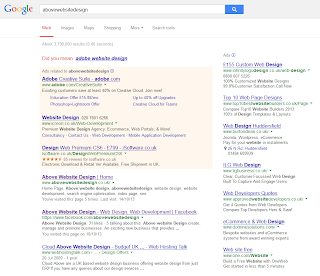 I would say about 50% of the small businesses I talk to about regarding creating a websites at first have the response that they are not interested as they have a Facebook page or Twitter account (other social media companies are available!) or they sell through ebay (other on-line auction sites are available!). So why do they need a company website?
I would say about 50% of the small businesses I talk to about regarding creating a websites at first have the response that they are not interested as they have a Facebook page or Twitter account (other social media companies are available!) or they sell through ebay (other on-line auction sites are available!). So why do they need a company website?This can be most frustrating for website designers and developers because in trying to explain the importance of a company website you can be perceived as trying to 'sell' your website skills to them, which is unfortunate (and probably not too far from the truth!).
This has created a Social Media V's Website culture which shouldn't exist. I always think about the big businesses, I mean really BIG. They always have a website and in many cases don't bother with social media sites.......So why is that?
Well, a good business website will promote your business and services completely, in a professional manner with a user interface that is easy to use and navigate. This creates an instant trusting relationship with your customer base and enforces your company brand, allowing the owner of the website to, in many ways, control and possibly manipulate how the business is perceived.
 Social media can promote your business well, but as you gain notoriety you can loose control of how your business is perceived and it can also take up a lot of time to address comments and statements left about your business. Bear in mind that not all comments left on social media sites and review sites are genuine! (They may be left by competitors in an attempt to damage their competitions reputation and adversely they may be left by your own business or company itself, via business employees or friends and family of the business 'helping' the reputation of the business).
Social media can promote your business well, but as you gain notoriety you can loose control of how your business is perceived and it can also take up a lot of time to address comments and statements left about your business. Bear in mind that not all comments left on social media sites and review sites are genuine! (They may be left by competitors in an attempt to damage their competitions reputation and adversely they may be left by your own business or company itself, via business employees or friends and family of the business 'helping' the reputation of the business).Monitoring what remarks are left on social media sites is very important and when a comment is left many genuine customers will expect an immediate response from the business. Which is very hard to achieve all the time but customers quite often won't care what you have on, they have a problem and you need to solve it now! Failure to do so will open the flood gates for more negativity so you better act quickly and be warned your actions could set a precedent so make sure you respond appropriately!
Obviously, as I work for a website design company I would always choose the website option over anything else for a business! (It's my lively-hood after all), but I think that the Versus scenario is now outdated.
Social media and websites should go hand in hand,
 small businesses can't ignore the exposure that social media brings and it is often free and easy to use. If you are starting up in business you need to be present on social media sites. Social media sites can really help to reinforce a website and usually a company website will provide 'links' to the social media sites they are involved with in order to actively take advantage of the exposure that social media brings, similarly social media sites should link to you company website to take advantage of the security and trust associated with a company website.
small businesses can't ignore the exposure that social media brings and it is often free and easy to use. If you are starting up in business you need to be present on social media sites. Social media sites can really help to reinforce a website and usually a company website will provide 'links' to the social media sites they are involved with in order to actively take advantage of the exposure that social media brings, similarly social media sites should link to you company website to take advantage of the security and trust associated with a company website.I would advise anyone starting a business or already in business to consider social media and websites as a joint on line marketing strategy. The company I work for Above Website Design is primarily a small business specialist website design company that works to provide your business with a website and to promote your website across the world wide web. We will always offer advice on which social media site is best for you and in many cases set up the suggested social media account on your behalf free of charge.
So, if you are considering whether to go for either a website or a social media presence on-line then check out our and other website design companies as the web design company may do all the social media incorporation for you too.















